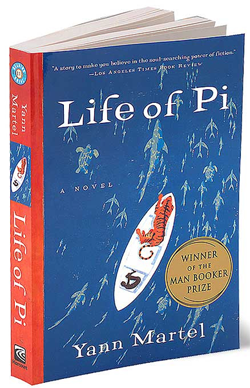Syllabus for 4/20 through 4/24
YANN MARTEL’S NOVEL CAPTURES our search for meaning: What is true, and what is real? The main character, a young man from Pondicherry, India who is forced to move with his family to Canada, questions everything he knows and believes via a desperate contest for survival. Pi, therefore, must re-examine life as he knows it, from the most mundane (brushing your teeth) to the most sublime (God’s plan for humanity). As you read, pay attention to the assumptions we make about what is true in life. How does Pi’s search for answers parallel your search for purpose and meaning in life? How does Pi’s experiences give us a model for Jung’s individuation process? Annotate for these answers as you read.
MONDAY: GREY DAY/OFFICE HOURS
Today is a grey day, and you can meet with me during Zoom office hours 12:50 and 1:50 pm.
Check Canvas for the link to Zoom.
TUESDAY: BLUE DAY / No class
Finishing your one page paper analyzing Achilles’s individuation process. What would Jung say about this iconic mythological figure? Submit these to Canvas by class tomorrow.
WEDNESDAY: GREEN DAY
We will start with a zoom meeting. Check Canvas for that link.
I will cover some introductory material on the novel, especially background.
Moving on to a journal entry: What, if any, was your religious upbringing? Do you practice a religious faith, and if so, what and why? If not, why not? Do you believe in God? What are your religious beliefs? We will spend 10 minutes writing, and then will discuss, for at least 10 minutes,
Homework: Read chapters one through four in the novel. Use the audio; it is excellent!
THURSDAY: BLUE DAY / no class
This weekend you will be watching and keeping notes on a documentary on Islam.
FRIDAY: GREEN DAY
FOR CLASS: Zoom discussion: Pi believes that animals in a zoo are no worse off than animals in the wild. Do you agree with him?
HW: Watch and keep notes on the above documentary. You will turn these in on Wednesday for class. Read up through and including chapter 16



